Czech Republic in security research in the Horizon Europe programme
03/05/2024

The statistics concerning project coordination are a kind of evergreen in many analyses related to the monitoring of participation in the FPs. We have already presented some of them through this web portal. In a paper published in the middle of December last year entitled "Wheels are turning: Czech universities are succeeding in coordinating European RIA projects", we discussed the successful performance of Czech universities in terms of coordinating RIA projects in the first two years of the Horizon Europe programme. In this article, we will analyse the structure of coordinated projects from a broader perspective and look at how the Czech Republic is doing compared to other EU countries.
The analyses of TC Prague (formerly TC AV ČR) have long mentioned the low number of Czech coordinators, especially coordinators of consortium projects oriented towards research and innovation, in connection with the participation of the Czech Republic in the FPs. According to internal analyses of TC Praha, coordinators from the Czech Republic accounted for only 9% of Czech participants in FP5 projects, and even only 3 % of participants in FP6. In FP7, Czech coordinators again accounted for 9% of all Czech participation, in H2020 it was 13 %. In all cases, these were among the lowest shares among EU countries.
In the first two years of Horizon Europe, the situation for the Czech Republic has improved. Czech coordinators represent less than a fifth (19%) of all Czech participants, and this share ranks the Czech Republic 5th among the other countries. Czech project coordinators thus represent a significant part of the overall participation of the Czech Republic in Horizon Europe. The higher share of coordinators makes the Czech Republic very different from the other new EU Member States, where coordinators, with the exception of Malta and Slovenia, do not reach even 10% of the participants from these countries in this FP. In terms of the number of coordinators, the Czech Republic ranks 14th among EU Member States and 1st among the so-called new EU Member States. In the course of the Horizon Europe programme so far, the Czech Republic has about half the number of coordinators as Austria, but one third more coordinators than the much larger Poland in terms of population and researchers. However, the Czech Republic is lagging behind Greece and Portugal, which, similarly to the Czech Republic, are classified as "widening" countries. See Figure 1 for more details.
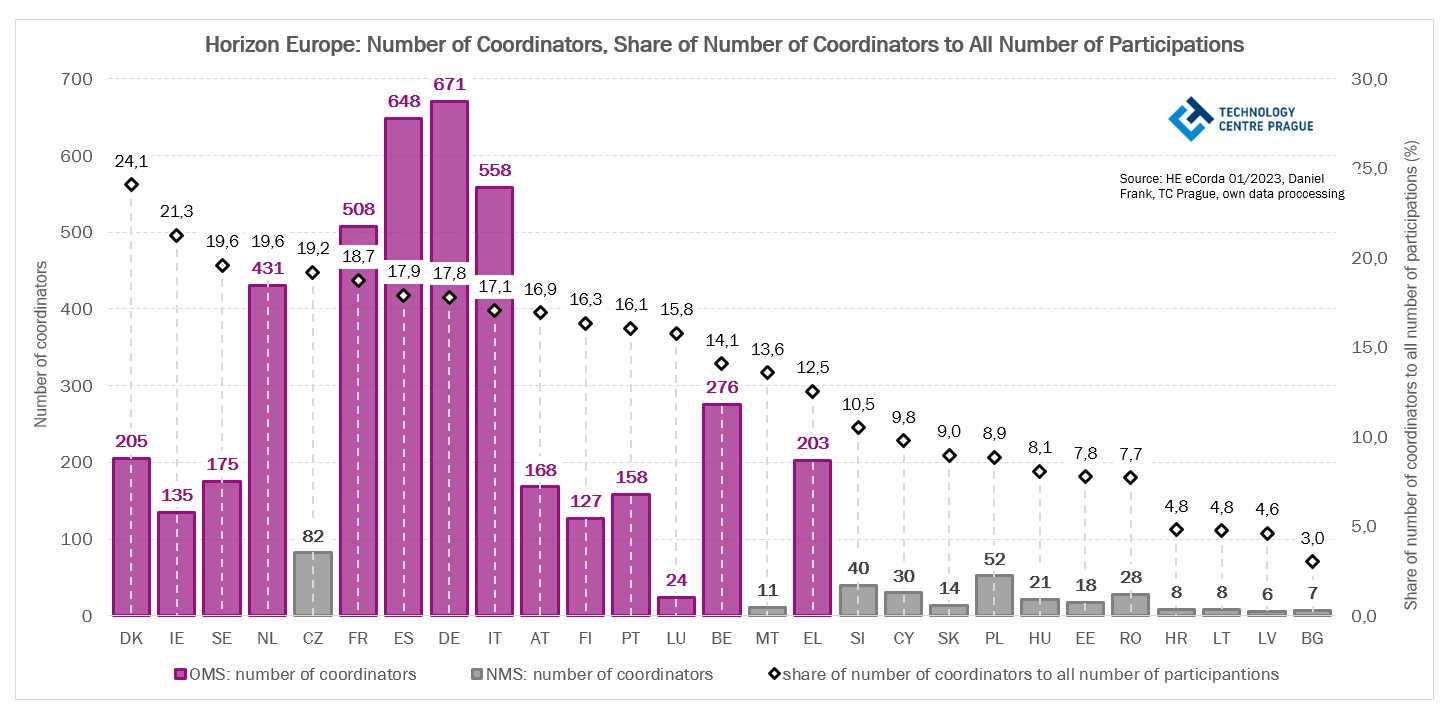
Figure 1: Number of coordinators in EU countries, share of coordinators to all participations in each EU country
Horizon Europe projects are very diverse in character, focus, form and purpose. Some types of projects and grants are aimed at individual researchers, while others are addressed by multi-member international consortia of researchers and institutions. Most projects are primarily research-oriented, but many projects contribute to the objectives of the Framework Programme, but do not generally include research or innovation activities. It is obvious that the differences in projects also lead to different requirements for their management and coordination. For this reason, for a more detailed and precise analysis, it is useful to divide projects in terms of their degree of orientation towards research and innovation or in terms of the nature of the project itself into individual grants (mono-beneficiary grants, projects) and consortium projects (multi-beneficiary projects).
In the following analyses and statistical outputs, we will therefore divide the projects into the following four categories:
The changing share of the number of Czech coordinators can be compared in two consecutive FPs - H2020 and Horizon Europe. Table 1 shows the share of the number of coordinators in EU countries in both FPs. The first part of the table refers to the share of the total number of coordinators without distinguishing the type of coordinated projects. The middle part of the table shows the shares of the number of coordinators of consortium projects with lower research and innovation ambitions and the third part of the table shows the shares of coordinators referring to consortium projects oriented towards research, innovation and scientific excellence. In all three cases it can be seen that the share of Czech coordinators among EU countries in Horizon Europe has increased quite significantly compared to the situation in H2020. Whereas in H2020 the share of Czech coordinators within the EU was 0.8 %, in Horizon Europe the share of coordinators is 1.8 %. A similar situation appears for the Czech Republic when we compare the shares only for consortium projects, both scientific and non-scientific. A positive fact is that Czech coordinators are better placed among EU countries to lead consortium projects that are close to "pure science".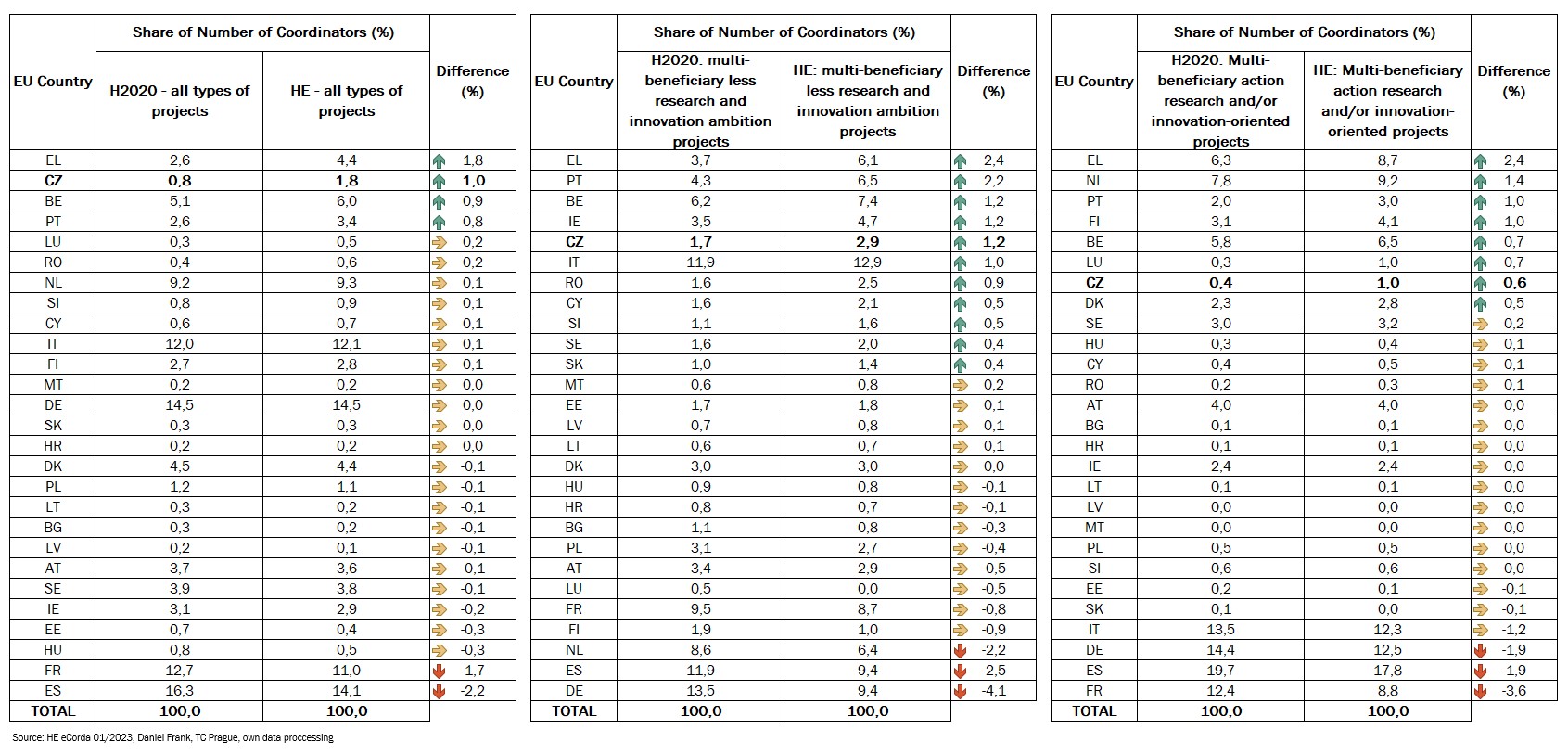
Table 1: Proportion of EU country coordinators in H2020 and Horizon Europe. Note: EU countries represent 100 %.
The strong importance of the Czech coordinators for the participation of the Czech Republic in the Horizon Europe programme is evident from the distribution of the financial support for coordinators in relation to the total financial support of the individual EU countries (Figure 2). The financial resources allocated to the coordinators from the Czech Republic account for 44 % of the total financial resources allocated to the Czech Republic in the ongoing Horizon Europe programme. The Czech Republic ranks first among all EU countries in this indicator. Most of the new Member States do not reach even half of this share. It is also clear from Figures 2, 3 and 4 that the structure of projects coordinated by Czech researchers and institutions is more similar to that of projects coordinated by the old Member States, given their nature. The coordination of purely research and innovation-oriented projects, whether individual or consortium projects, plays a significant role here. For the majority, or more correctly for the nine new Member States, the number of coordinators of research and innovation-oriented projects is below the 50 % threshold. In Estonia, Slovakia and Bulgaria, the number of research and innovation project coordinators is even below the 30% threshold. No coordinators from Latvia coordinate any project with a higher research and innovation ambition so far. In contrast, these countries have a significant prevalence of coordination of projects that are not focused on science per se, but rather on other research-related activities.
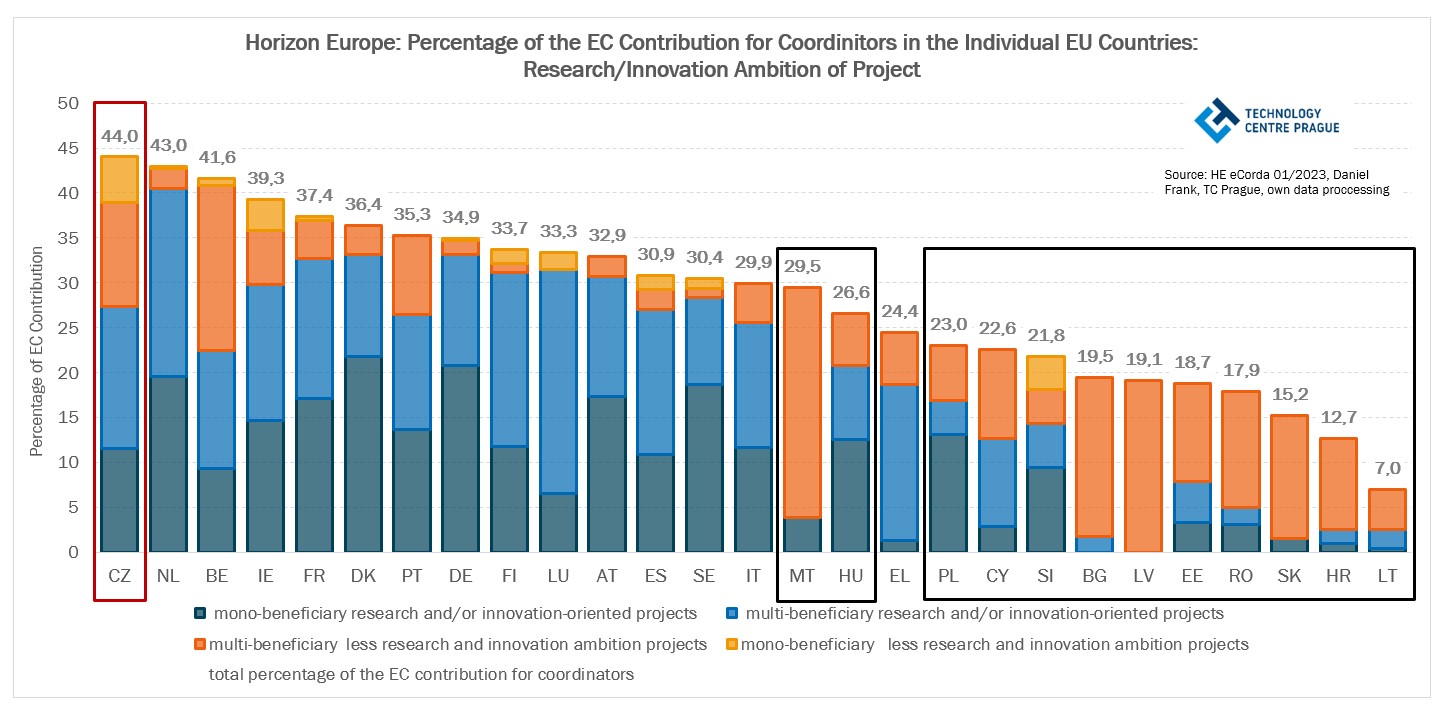
Figure 2: Percentage of financial contribution for EU country coordinators in each type of Horizon Europe project in relation to the total EU national contribution in this FP
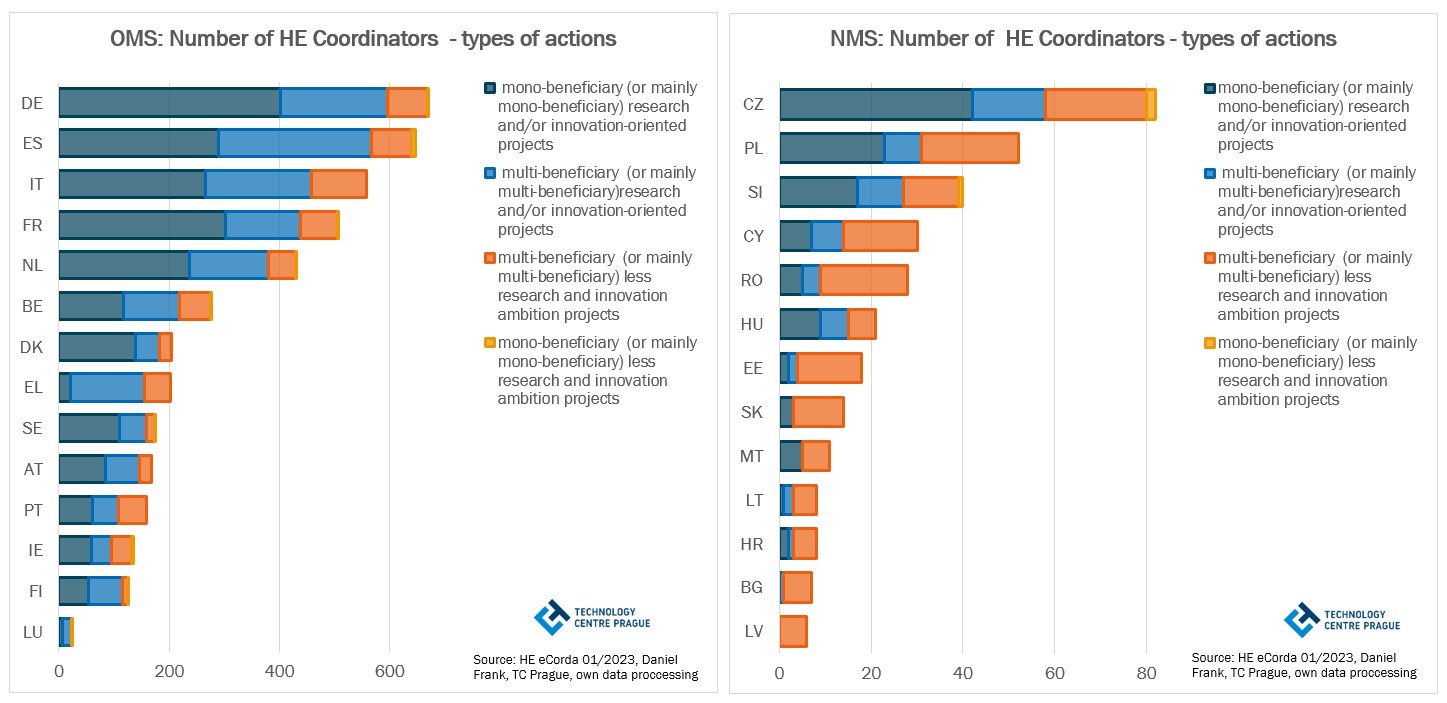
Figure 3: Number of EU country coordinators in each type of project
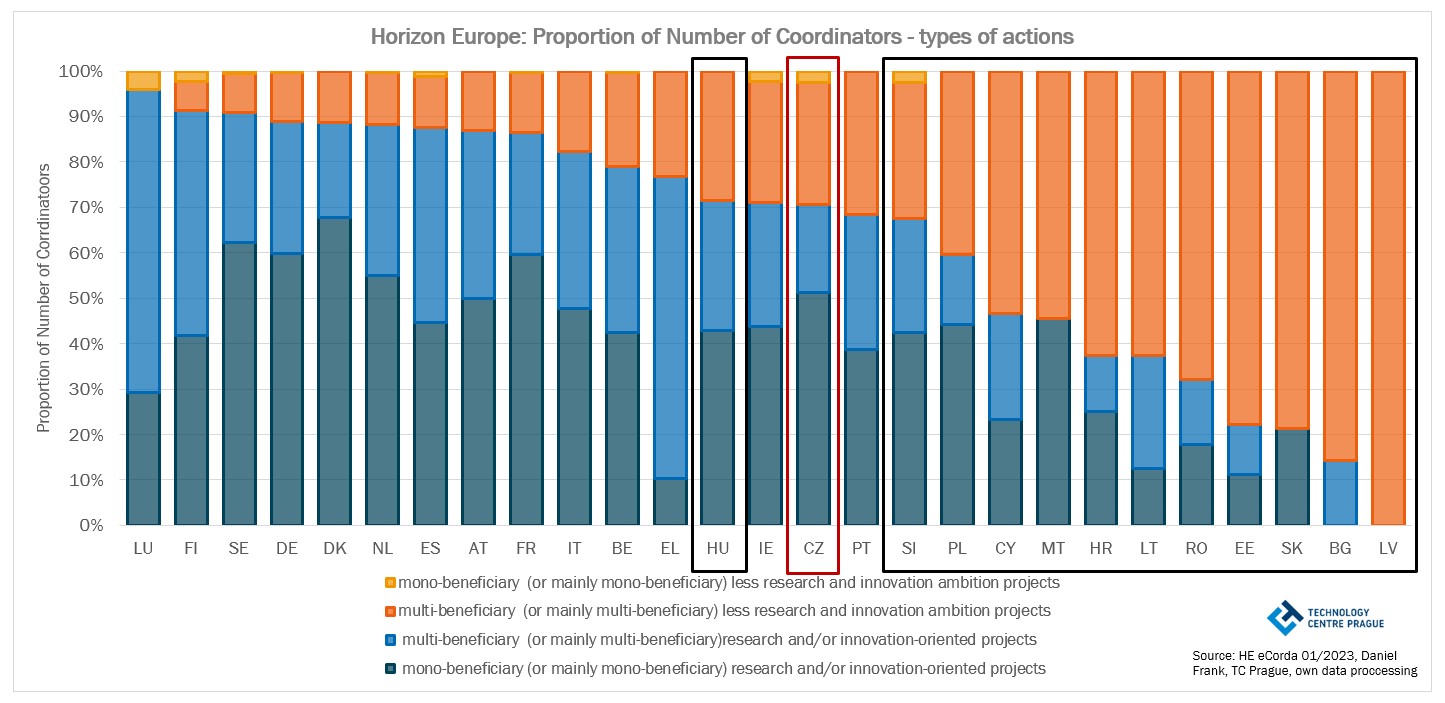
Figure 4: Share of coordinators in each type of projects
The structure of projects under the leadership of Czech coordinators is not only similar to the old Member States in terms of types of projects, but also in the distribution of coordinated projects according to the pillars and priorities of Horizon Europe. Similarly, to the old Member States, at least 70 % of the funds in the Czech Republic are dedicated to the coordination of 2. Pillar of Horizon Europe projects, ERC individual grants and MSCA projects. In contrast, in most of the new Member States, project coordination relies exclusively or to a large extent on the horizontal priority for countries with a lower level of R&D - Widening participation and spreading excellence, which has territorial preferences in the sense that research and innovation developed countries cannot coordinate projects funded by this priority.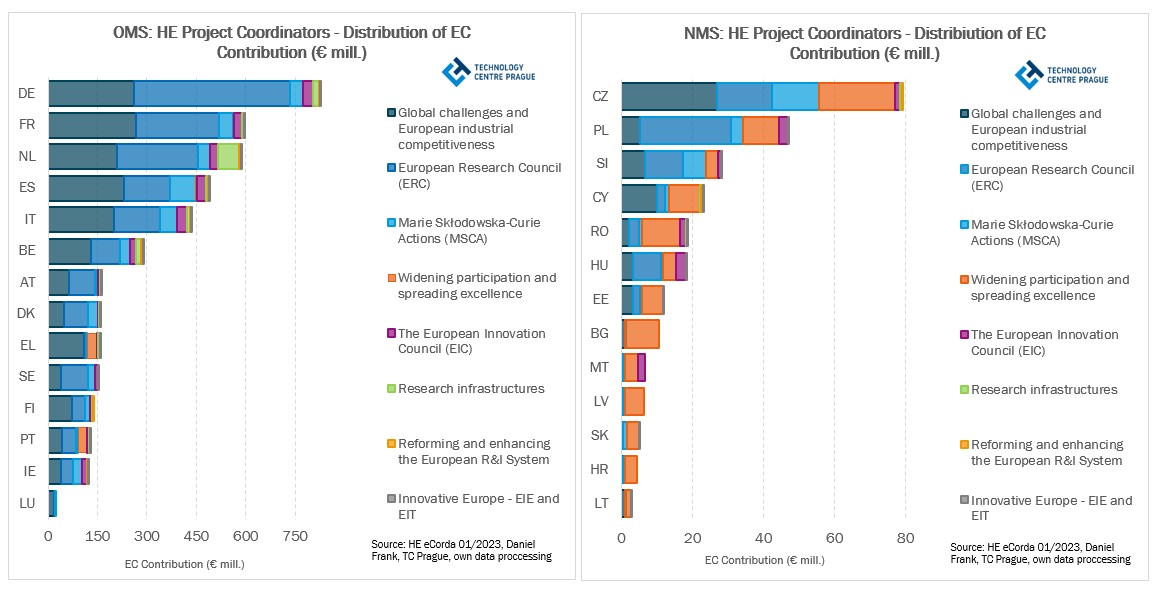
Figure 5: Distribution of financial resources for EU country project coordinators according to Horizon Europe pillars and priorities
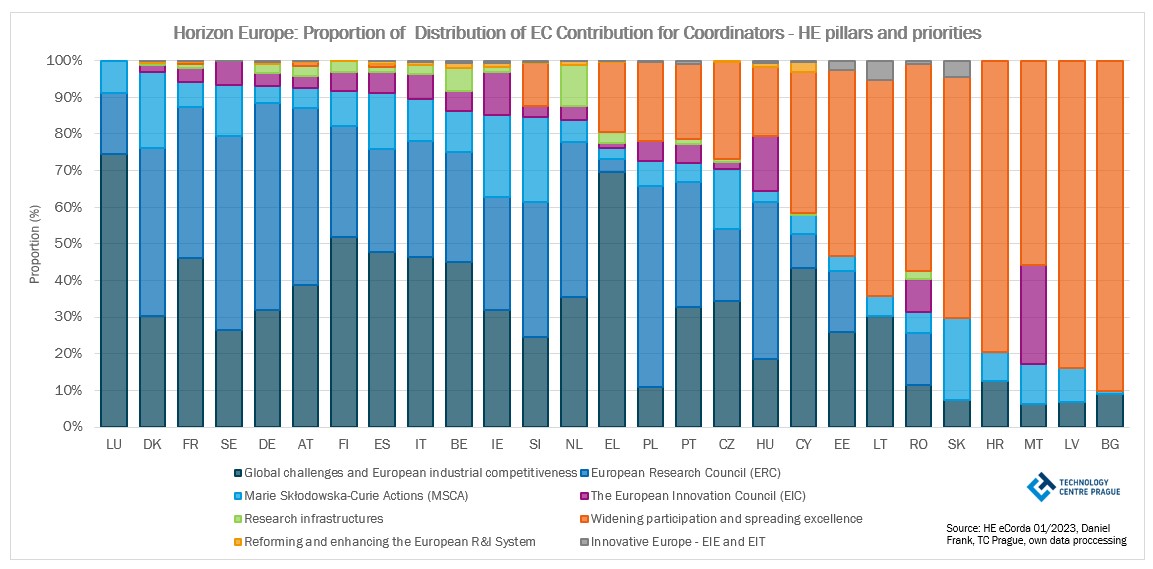
Figure 6: Proportion of financial distribution for EU country project coordinators according to Horizon Europe pillars and priorities
The size of the project consortium is very often cited as one of the limiting factors in the context of new Member States, which negatively affects the resulting number of coordinators in these countries. There is no doubt that managing an international project with many partners is a very demanding thing for a coordinator for many reasons. In many cases, institutions from the new Member States do not have sufficient staff and organisational resources to coordinate complex FP projects. When these countries coordinate such projects, they are generally projects with fewer partners (see Figure 7). Conversely, all the old Member States are among the countries that coordinate at least one third of projects with a large number of partners. This fact concerns only four of the new Member States: Bulgaria, the Czech Republic, Romania and Poland. Only the Czech Republic, however, has a higher proportion of projects in which research and innovation activities (RIA and IA projects) predominate. For the other three countries, these projects are funded by the MSCA priority and aim at networking, supporting the mobility of researchers or scientific staff. It should be added that multi-beneficiary projects in Horizon Europe within the EU are divided approximately 1:1 in terms of consortium size, i.e. 50 % of projects with consortia of 3 to 12 partners and 50 % of projects with consortia of more than 12 partners.
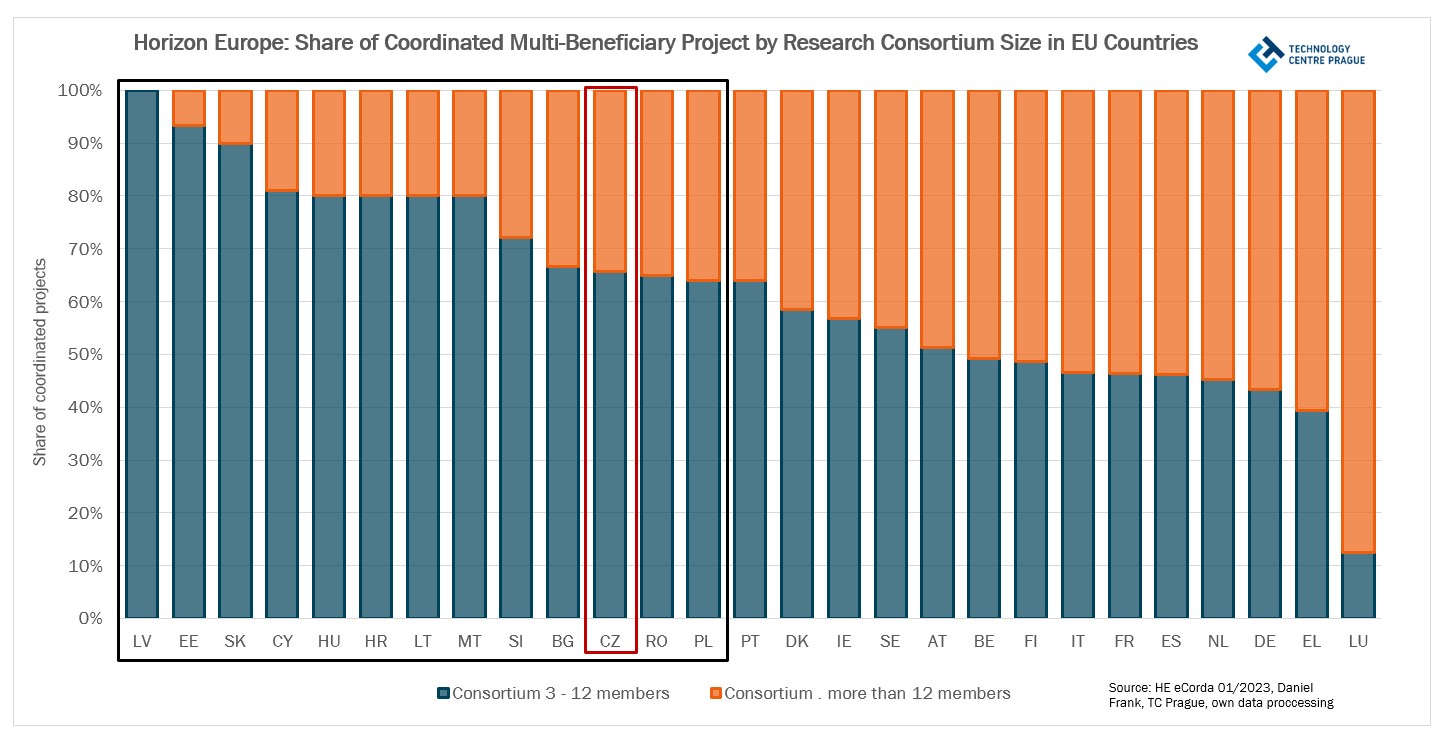
Figure 7: Proportion of coordinated multi-beneficiary projects by size of the research consortium
Conclusion:
A brief analysis of the project coordination structure of the EU countries shows that the Czech participation in Horizon Europe to a high extent is influenced by the high proportion of coordinators. The Czech coordinators, of all types of projects, contribute the highest share to the national balance of the allocated funds from the Horizon Europe budget of all the EU countries compared. The Czech Republic is the only one of the so-called "widening" countries that has managed to be among the research performing old EU Member States in terms of the intensity of coordination, i.e. the share of coordinators to all participants. The high share of coordinators to the total number of participants can to some extent be understood as the quality of the countries' participation in the FP. The Czech Republic has not only approached the research and innovation strong countries of Europe in this indicator, but has even surpassed some of them. The Czech Republic is one of the three "widening" countries in the EU where more than 70% of coordinated projects are mainly focused on research and innovation. In terms of the structure of Horizon Europe, the Czech Republic is closer to the old Member States with a prevailing proportion of coordinators in those parts of Horizon Europe that have the largest budgets, i.e. ERC, MSCA and Horizon Europe Pillar 2 Clusters - Global Challenges and European Industrial Competitiveness. It is evident that some Czech institutions have the potential to manage projects with a relatively large number of partners to a larger extent than is usual in the majority of new Member States. This may indicate not only the professional preparedness of the Czech coordinators, but also the improving administrative and organisational background in their home institutions
It is too early to define the reasons for the improved situation in the management of FP projects by Czech researchers, research organisations and other entities. Positive changes can be found in particular in the relative success in obtaining some types of ERC grants in the first calls of Horizon Europe, in the success of Czech universities in coordinating RIA projects, and in the very good participation in the horizontal priority Widening participation and spreading excellence. Considerable attention has recently been focused on supporting coordinators at universities and through special consultancy activities organised for coordinators by TC Prague and other organisations. Individual applicants for ERC grants can work with the Expert Group for supporting ERC applicants, etc.
If in our last evaluation report on Czech participation in the H2020 programme (in Czech language only) we stated that Czech researchers, research institutions and other entities coordinate 4 times fewer projects than Austria, now in the first third of the Horizon Europe programme we can say that Czech researchers coordinate "only" 2 times fewer projects than Austria. Given that the pull effect has been proved in the context of project coordination (especially consortium projects), i.e. the ability of the coordinator to attract and involve other national participants in the project and thus increase participation in the FP, it would be desirable that the number of coordinators in the Czech Republic would also be close in absolute terms to countries with a similarly large research potential (in terms of number of FTE researchers), such as the already mentioned Austria or developed Denmark. The Czech Republic should also come close in the number of coordinators to two countries that are part of the group of so-called "widening" countries, i.e. Portugal and Greece.
It cannot be omitted that all the static outputs monitoring the participation of countries in Horizon Europe are certainly affected by the limited participation of Switzerland and in particular the United Kingdom. Both countries were among the leaders in European research in the previous FPs. Indeed, the UK itself coordinated over 15,5 % of the projects funded in H2020 programme. However, this does not undermine the current position of the Czech Republic in terms of project coordination among EU countries and its efforts to move closer to the research leading European countries in the FPs.
Author Daniel Frank, TC Prague, frank@tc.cz
The author is fully responsible for the formal and factual content of the article.
Publication and dissemination of the content of this article or its parts and attachments in Czech or any other language is only possible with mention and citation of the source.
Note:
„Widening“ countries - Countries that are low performing in the area of research and innovation (70% of the EU average) are considered to be „widening“ countries. This means that organisations from these countries can be the coordinators of science-based schemes, namely ERA Chairs, Twinning and Teaming, and thus have the opportunity to be mentored by internationally leading partners of their choice, the so-called advanced partners. The Czech Republic is also among the "„widening“ Countries".
03/05/2024
18/04/2024
18/03/2024